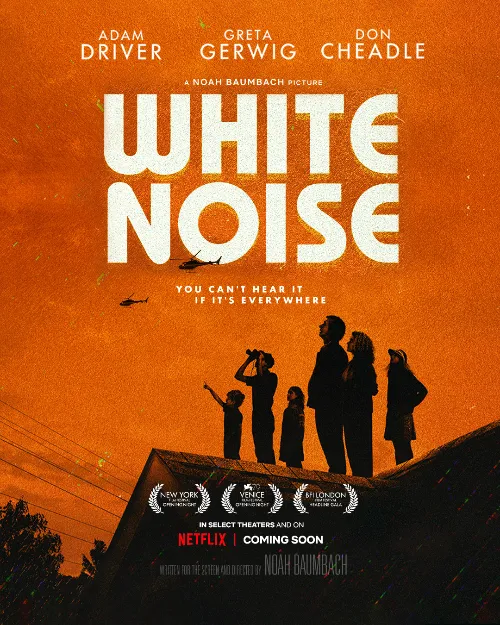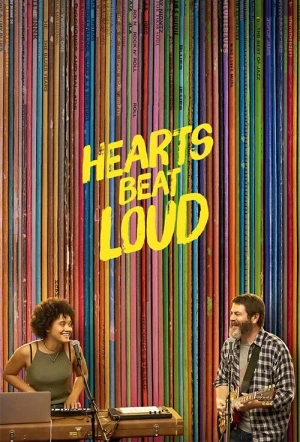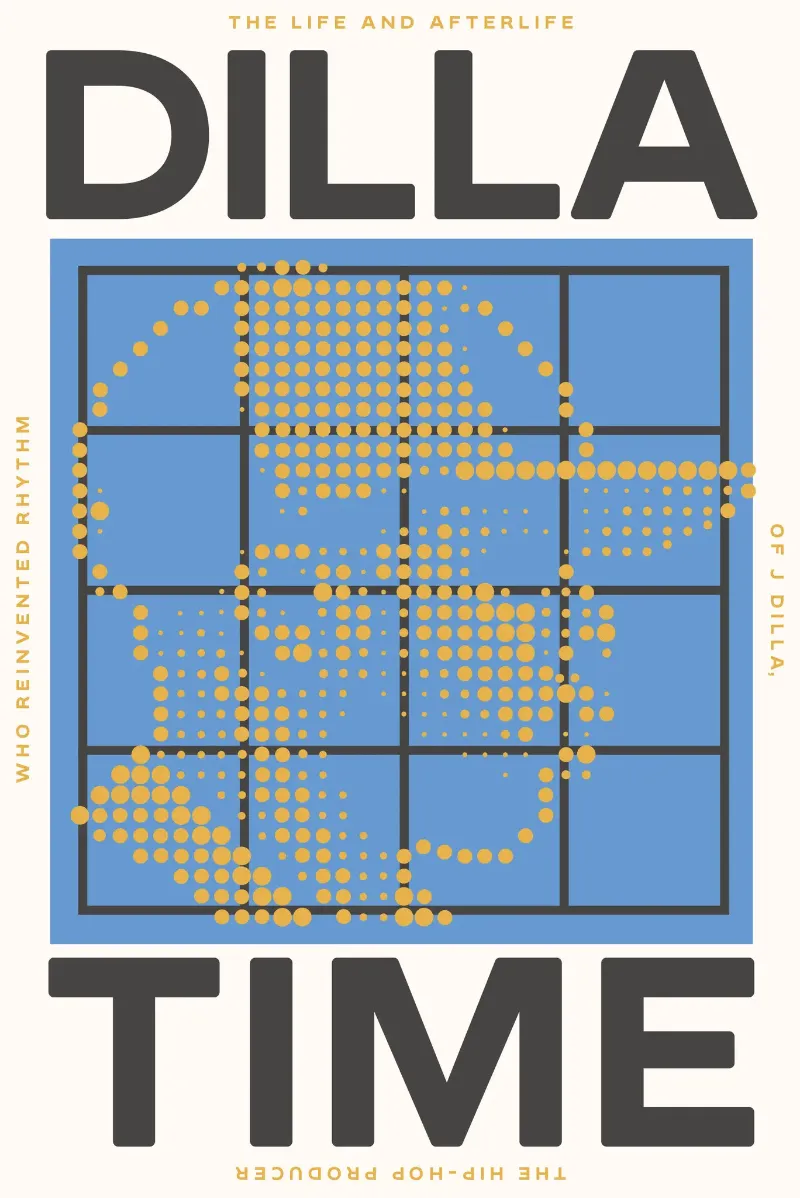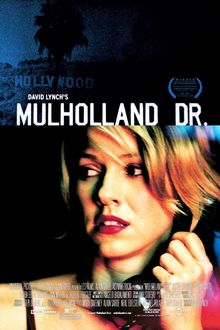— Web Roulette is a new web browser app for iOS, but it only lets you access a random page from a customisable list of pages. You swipe left to access a new site, and if you’ve swiped enough you can shake your device to access a random site that isn’t on your list. I can see that this is fun and useful. Instead remembering hundreds of sites you want to visit occasionally, you can have Web Roulette take care of the hard work to remember those sites. The more sites you have selected the better. But I also worry that Web Roulette will have a terrible impact on my already terrible productivity. (via)
Posts from May 2023
— Madlib is playing a rare Australia DJ set in Melbourne next week on 17 June.
Fantastic explanation of the inner workings of the Linotype machine, a typesetting machine that was used for typesetting until the 1980s when it was replaced by phototypesetting and digital technologies. (via)
White Noise

— “White Noise” isn’t a bad movie, but it’s not great either. And while I prefer odd and quirky movies over one that’s too serious any day, I can’t shake the feeling that Noah Baumbach tried a little too hard to make a film that feels different; to me, it feels borderline self-indulgent.
Interestingly, the trailer shows only scenes from the second act, the “airborne toxic event,” which is the strongest part of the film. Following a freak train accident, a great panic ensues once the toxic cloud reaches town. Families are scrambling to get their things together to escape the poisonous threat. The authorities aren’t prepared, treating the issue as an emergency drill, while looking for an effective emergency response. Some are worried about getting sick, others are frantically following the news. And then, as if nothing happened, the family is back at home, living their lives, not a single word about the previous live-threatening and -upending crisis. It sounds all very familiar when you look back at the last three years. In a time of crisis humans are more susceptible to group-think and conspiracies. Depicting the absurdity of it all is the one thing “White Noise” does really well.
(2022) Director/Screenplay: Noah Baumbach. Cast: Adam Driver, Greta Gerwig, Don Cheadle.
— With Arc Brower’s updated Boosts feature, you can customise any website by changing colours, fonts, or text size. By far the most useful feature is Zap, which removes content from a website by merely clicking on the element. It’s a great, intuitive tool to de-clutter enshittified websites like Twitter or Youtube.
— Today I learned, Facebook had (still has?) an in-house letterpress and screen print workshop.
WordPress is Twenty Years Old Today
— Back in 2004, I wanted to start a blog. I had been researching blog engines for a while. We had many choices back then. There was Blogger.com, Movable Type, Typepad, and TextPattern. But it was WordPress that allowed me to get things going. It was easy to install; all you needed was a webspace that had PHP installed, a MySQL database, and an FTP client (you do remember those, right?). Its interface was simple, and so was building a theme for your site.
Even with my little knowledge of servers, and computers in general, I could set up a website in one night. WordPress brought the prospect of running a blog on your own webspace within arm’s reach, and it did so for many million other independent content producers.
Wordpress is 20 years old today. To say it revolutionised blogging by making a great product available for free under an open-source license is an understatement. Estimates say some 810 million websites run on WordPress today, that’s 43% of all of the Web. Amongst CMS-driven websites, WordPress has a 64% market share. It’s hard to imagine how many websites were brought to life just because WordPress exists.
And Automattic, the company that maintains and develops WordPress, is one of the few organisations that care about the Web. Automattic makes it easy to move your blog away from WordPress.com. They still support the development of WordPress and implement open standards like ActivityPub to promote an open and decentralised Web.
Here’s to another 20 years of WordPress.
— Wonderful profile of Bellerby, maker of bespoke, handmade globes; explaining the intricate process:
globemakers work with gores, which pose a unique set of challenges. These long, thin, oval-shaped pieces of pre-printed paper must be carefully cut by hand and painted with a translucent wash of watercolour that lets the coastlines and place names show through. It’s a process that can take five to ten days, says Isis Linguanotto, head painter and a globemaker for ten years, who sits at a wooden workbench cluttered with jam jars of ink-coloured water, brushes and well-used paint palettes. A row of half-painted gores has been laid out flat to dry. Linguanotto will build up the thin layers of paint to shade and define borders and landforms – details as important for readability as aesthetics.
Once the painters have finished the first stage of their work, each gore is dipped in water, making it pliable (and very fragile) so that it can be stretched and carefully pasted to the fibreglass sphere. Most globes use 12 gores – larger ones may need 18 – and each must align perfectly with its neighbour, without overlapping, to ensure that every map line meets in the right spot. Overwork the paper and it will deteriorate and tear.
Just in case you were wondering why these things are so expensive.
— Blur have announced a new album: The Ballad of Darren will be released on 21 July.
I always had a soft spot for the band and Damon Albarns work (well, with the exception of Gorillaz, which never clicked for me)—so, yeah, I’m looking forward to this.
The Weblog as a Second Brain
— I’ve been online for twenty-five years, and during that time, I’ve seen much noteworthy content—but I forgot most of it. I will never be able to find any of these publications again. It’s the reason this site exists and why I started blogging in a more serious fashion.
A blog, as in web-log, creates a trace of anything I come across and find noteworthy. An index by topic, using tags, and time, the monthly archives, allow me to dive into previous thoughts on a topic or at a point in time.
Cory Doctorow puts it more eloquently:
[T]he blog as an annotated browser-history, like the traveler’s diaries my family kept on vacations, recording which hotels we stayed in and what they were like, where we dined and what we ate, which local attractions we visited and how we felt about them.
Like those family trip-logs, a web-log serves as more than an aide-memoire, a record that can be consulted at a later date. The very act of recording your actions and impressions is itself powerfully mnemonic, fixing the moment more durably in your memory so that it’s easier to recall in future, even if you never consult your notes.
The more important aspect of blogging, however, is writing to publish. Writing requires the author to structure incoherent and fuzzy thinking and turn into writing that conveys a message in a way others can follow.
The act of making your log-file public requires a rigor that keeping personal notes does not. Writing for a notional audience — particularly an audience of strangers — demands a comprehensive account that I rarely muster when I’m taking notes for myself.
In return, the process of writing builds a deeper understanding of and form informed opinions on the subject matter.
When I come across something I read, my caveman brain generally reacts in one of two ways: I like what I read and agree. Or I disagree. When I don’t agree with something I read, forcing myself to explore my position through writing often changes my perspective. I understand someone else’s perspective better. And even if I still disagree, at least I’ve put down words why I disagree. In either case, I end up knowing more.
— Doubleclick were one of the first companies to sell ads online, on a large scale. In the early 2000s, selling ad space became the de-facto way to fund your online business , which fed the bubble that eventually led to the 2001 financial crisis:
Companies were flush with cash from wave after wave of seed investment. So naturally, they had plenty of money to buy ads, usually in other Internet companies. Startups bought ads and published them on the sites of other startups. Doing so inflated everyone’s value.
And of course, Doubleclick also birthed the idea of using cookies to track online behaviour, what ads we see and what ads we click.
By shifting the source of the cookies to a single domain under their control, in this case the DoubleClick servers, data between sites could be aggregated and distributed, as long as each site agreed to install a snippet of code that gave DoubleClick partial access to their data.
So here we are, more than twenty years later, and it’s as if nothing has changed.

— ECHO, a New-York-focussed online social network, has been running for 34 years, and today has 43 active users.
— Former Wikimedia chief executive Katherine Maher received a severance package worth more than $600,000 when she stepped down from the role in 2021. I thought severance packages are only paid to laid-off workers.
Killer Mike, EI-P – Don’t Let The Devil ft. thankugoodsir
— The Blog Era, a new podcast series, explores the world of hip-hop blogs, which shaped the whole industry and media coverage during the form’s hey day from about 2007 until its beginning demise around 2012.
— Tech journalist Casey Newton asked his readers how they want from coverage of developments in Artificial Intelligence. What people want is clear-headed journalism. Knowledgeable reporting of facts and current state of affairs and the people making decisions, and less punditry and little speculation.
— Aboard is a new bookmark service helping you and your friends to organise and collaborate on content collections.
It lets you build your own corner of the Internet—solo or with friends. It organizes web pages and your own thoughts into Stacks of Cards and gives you tools to sort them.
Very similar to Are.na, but giving off strong “we’re looking for VC funding and an exit” vibes.
Oral Histories Everywhere
— Oral history is a method historians employ to gather information about historic events from people who lived though those events. Its goal is to capture additional perspectives different from official historic records like newspaper articles, political speeches, or once secret memos. We’ve seen oral histories from survivors of the holocaust, slavery, and wars, shedding light on individual fates. Pretty heavy stuff, very important work.
Now, oral histories are all over the Web: There’s one for the recently axed BuzzFeed News, one for MTV News, which shares the same fate, and another for Sydney’s declining clubbing scene. Whenever someone sat down with a group of people to interview them to recount the rise and fall of something that was once important to some; it gets the oral-history stamp of approval.
And there’s more where that came from:
- The K-Pop group BTS announced the oral history of the group in book form,
- An oral history of sports betting,
- Chris Pratt and James Gunn do the same for the Guardians of the Galaxy franchise,
- The oral history of Legends of Tomorrow is looking for funding, and
- Another one for Lary David’s flopped film debut.
All published within the recent weeks. It could be a case of the Baader-Meinhof phenomenon. Could be a trend too: The international guild of online writers has discovered a way to make headlines sound more profound; to coat reporting of mundane topics with an aura of historic importance.
— What I Want From the Internet, by Christopher Butler:
It is hard, though, to build and maintain the structures of the old, “smaller” internet. You can, today, still go back to the can-to-can structure that a personal website, an RSS feed, and a browser provide. It’s not perfect. It leaves an enormous amount of signal unheard. It requires more work to find things, and to be found.
Big-tech platforms limit us in different ways. The algorithms prefer certain content, so content is created to fit the preference. They limit how our content is presented. They limit what you can see. The old, smaller internet is more work, yes. But the effort is worth it if you want to experience an interesting, diverse, surprising web. (via)
— Vice Media has filed for bankruptcy. When Vice started almost ten years ago, it appealed to the time’s zeitgeist. Vice published stories that did well on social media, stories that were unconventional in what was reported and how it was reported. Reporters went to war zone and other extreme locations delivering stories that fared well with the you-won’t-believe-what-happens-next-audience. Some called in Gonzo journalism but that, frankly, an offence to Hunter S Thompson. And just how Buzzfeed‘s answer-these-five-questions-and-we’ll-tell-where-you-should-live clickbait got boring, audiences grew out of Vice‘s semi shocking reporting. Because the world got a lot scarier near our cozy middle-class homes and because we got older. In the same way going to bars and clubs became irrelevant, Vice became irrelevant.
Plexus

The location (an empty parking garage), the lights (many, flashy, arranged to form a grid), the music (loud, electronic)—Mandylights’ Plexus is like a random techno club in Berlin and just as disappointing. But it works as a reminder for how much of the clubbing experience hinges on drugs and alcohol and the people around you, and how little it has to do with lights, music and location.
— The show about nothing is about something after all. Maya Salam’s reading suggests Seinfeld is an antithetical stance on adulthood in the nineties, one where “they openly mocked the notion that professional success, marriage and parenthood were the cornerstones of existence.”
— Old School Flyers posts flyers of early-day hip hop parties.
— Liverpool artist Silent Bill questions the provenance of a Banksy artwork that fetched £250,000 in a TV auction. Whether or not the piece is a Banksy, Silent Bill is right about one thing:
The sale of the piece is everything that’s wrong within the art world, greedy rich people who can afford trophy art pieces as tax incentives.
Street art pieces are, as intended by its name, for the street. When Banksy comes to Liverpool and gifts the city a piece it’s for the people of the city, it’s not for concierge and lifestyle services to cut from walls.
— Removing the screen as the primary user interface and integrating AI, like the device demonstrated by Humane’s Imran Chaudhri, is the logical next step for mobile technology. But it seems, we’re still a fair bit away from that future. The demo is obviously staged: When Chaudhri gets a statement translated to French, he doesn’t instruct the AI to do so. He presses a button and voila. It has to be mocked; unless, of course, that device can read Chaudhri’s mind. (via)
Hearts Beat Loud

— Sad record-store-owner dad starts a band with his about-to-go-to-college daughter. Makes you want to stop writing code for a living and open a record store instead so you can drink and smoke behind the counter and become the knowledgeable and slightly condescending purveyor of fine music you always wanted to be.
(2018) Director: Brett Haley. Screenplay: Brett Haley, Marc Basch. Cast: Nick Offerman, Kiersey Clemons, Ted Danson, Sasha Lane, Toni Collette.
— The Verge’s Nilay Patel boils down the effects of Google status as the default way to discover information on the Web:
Google’s grand promise was to organize the world’s information, but over the past quarter century, an enormous amount of the world’s information has been organized for Google — to rank in Google results. Almost everything you encounter on the web — every website, every article, every infobox — has been designed in ways that makes them easy for Google to understand. In many cases, the internet has become more parseable by search engines than it is by humans.
The piece is the first in a series of articles commemorating Google’s 25th birthday trying to better understand how Google works to shape the Web.
— The CSS Zen Garden turns twenty. The site was, and still is, revolutionary. It demonstrated that separation of content and design are not only possible but also the right, future-proof way to build websites. Case in point: Most, if not all, designs on the site still work in today’s browsers.
Nice Idea

— The quality of many music artists’ output often declines after their initial modest indie success. The second album is ok; few people even mention the third. Not Kae Tempest. Their four albums were exceptional; each perfectly encapsulating the mood of this strange time. “Nice Idea,” Kae Tempest’s new EP, is no different. Recorded within a week and released for this year’s record store day, the vinyl is already sold out online. It’s no surprise; Kae—as always—delivers.
— An astonishing 382 kilograms of rock and soil have been collected from the moon. With Astromaterials 3D you can inspect 3D renditions of the samples and slice into their interiors—thanks to CT scans NASA made available.
Shiny Stuff, Golden Robes, Tacky Carriages
— I’m squarely with Doug Belshaw: Britain’s monarchy, any monarchy, is outdated and irrelevant. The king and his whole family have no role in Britains society other than selling coffee cups at crammed souvenir shops on Oxford Street. There’s no need to publicly celebrate or fund any of these events, no coronations, no funerals, no weddings. If the royal family is dying to throw a little party to celebrate their mere existence, by all means, they should. But theyshould also pay for it themselves; they can certainly afford it.
The ceremony is a weirdly interesting spectacle, steep with tradition and strange ancient rituals. There are costumes—so many robes—an abundance of shiny props and tacky horse carriages. But there is only little behind the pomp. An old man, whose sole achievement in life was to pop out of one specific vagina, is sat on an old chair wearing a coat, which is clearly too long, too heavy, and all around impractical. Another man representing an institution that has as little relevance as the monarchy, who should have no, and has no, legitimisation to put anyone in charge outside his own stuffy institution, especially not a state, he puts a hat on the first man, which is fitted with expensive rocks nicked from enslaved colonies, and, boom, you’re in head of this country now.
Imagine the ceremony took place in the local town hall as a purely bureaucratic transaction. The same way many couples get married today. Charles shows up, signs a couple of documents and ten minutes later it’s all done.
A minority in Britain still say the monarchy is very important. That’s the people who these events are for. And the tourists. I understand that sometimes you want indulge in a glamorous fairytale, even if you’re not part of it, or you want to re-live an era long gone. You can do that—in Disneyland. There’s no need for a county to spend millions so a band of cartoonish characters can parade down the street.
— Photos from the first Glastonbury Festival in 1971; from Paul Misso’s new book “In the Vale of Avalon Glastonbury 1971.”
— diamond geezer is live-blogging Charles’ coronation.
07:35 Trafalgar Square is pretty nuts.
07:45 Enough of this madness.
08:30 Back home with a cup of tea, watching it on the telly.
— Silicon Valley’s push to integrate AI into worker’s daily assignments is to increase worker efficiency and subsequently shareholder value; not to make the world better for everyone. And so fear about a future with AI is rooted in economic anxiety not worries that machines will take over and enslave us all. Terrific piece by Ted Chiang. (via)
— TikTok parent ByteDance keeps lists of sensitive words it tracks across its social media platforms.
Hundreds of vocabulary lists housed in the company’s “detection tool” illustrate the range of political, social and cultural topics that the Chinese giant is monitoring or suppressing.
— The Pudding examines dark user-interface patterns online platforms employ to prevent you from unsubscribing from their services; presented with the usual Pudding-esque playfulness.
Dilla Time

— Non-fiction is at its best when you learn unexpected things. In a book about a hip-hop producer you’d expect to read about colonialism and segregation but not necessarily about city planning or the economic decline of a city.
These inter-connected topics define the environment for James Dewitt Yancey growing up in Detroit to become one of the most prolific rap-music producers. Going by his stage name J Dilla, he is the mind behind classic rap tunes such as De La Soul’s “Stakes Is High”, Common’s “The Light”, or The Pharcyde’s “Running”.
J Dilla invented a new sound that would not only define the sound of Hip Hop going forward but also find its way into RnB, Jazz, and even pop music. Before J Dilla, there were two ways of musical timing: straight time, where the rhythmic pulse is divided equally and swing time where the pulse is “divided unequally, such that certain subdivisions (typically either eighth note or sixteenth note subdivisions) alternate between long and short durations”. J Dilla combined both these styles; he layered, stretched and compressed them to create a new rhythmic feels. The resulting sound is unexpected, a little off, and very different to the style du jour during the boom bap era—but also more intriguing. Most of the Hip Hop music I fancy today uses J Dilla’s rhythmic feel.
Soon big names started emulating Dilla’s production. Questlove wanted to play he drums like Dilla. D’Angelo wanted his album, though recorded with a live band, to sound like it came from J Dilla’s MPC. Pharell Williams and Kanye West cite him as influences. And yet, despite all of the industry recognition, J Dilla never had a commercial successful pop hit. The closest he came was probably Janet Jackson’s “Got ‘Til It’s Gone.” N’Sync, yes, the boyband, enquired about a remix that could have led to a lucrative contracts, but J Dilla turned them down. Instead Timbaland went on to remix N’Sync, to later produce Justin Timberlake and subsequently built a career by pulling faces in music videos.
Based on hundreds of interviews with Dilla’s contemporaries, Dilla Time sheds a light on the musical theory of his sound and how it inspired plenty musicians that came after him. But it also paints the complete picture of a conflicted man: Dilla almost exclusively worked with artists know for their soulful music, spreading messages of love and empowerment. But privately, he loved simple things, money, fancy clothes and going to the strip club. J Dilla had a temper he often took out on the people closest to him. He fathered two children with two women and apparently paid for several abortions.
Dan Charnas wrote a lovingly crafted homage to J Dilla that puts a man at the centre who often worked in the background and rarely got the recognition he deserved when he was still alive.
Dilla Time: The Life and Afterlife of J Dilla, the Hip-Hop Producer Who Reinvented Rhythm (2022). Farrar Straus Giroux. 480 pages.
— Thirty years ago CERN put the technology that made the Web in public domain; one of the most important decisions during the early days of the Web and one of the reasons it rapidly became a world-wide success.
— Mastodon announces an improved sign-up flow and new features in the future. Eugen Rochko’s posts reads like a direct reply to Erin Kissane’s critique from Sunday.
— Ryan Broderick joined Bluesky, the latest greatest Twitter alternative, and recapitulates the events he witnessed within 24 hours of signing up:
Yesterday, in the span of a few hours, Bluesky had its first “main character” moment and its first high-profile bullying incident. Two big milestones for any social network. The “main character” moment came after users discovered that dril’s username was reserved on the app, which meant he couldn’t get an account. A sex worker on the app said she was happy dril couldn’t join Bluesky because he had backed the #BlockTheBlue campaign on Twitter, which she believed was hurting the livelihoods of sex workers, the logic being that sex workers needed Twitter Blue to promote their services. Everyone dunked on her for a while and then moved on. A few hours later, after dril and a bunch of other high-profile Twitter users like Alexandria Ocasio-Cortez had moved over to Bluesky, blogger Matthew Yglesias announced he had joined, as well. And then a bunch of users threatened to kill him with hammers until he announced he was taking a break from the app. User have not threatened to beat Jake Tapper to death, for what it’s worth.
Sounds fun. I think I will channel my age-appropriate inertia and wait this one out; sticking to blogs.
— Erin Kissane dissects Mastodon’s shortcomings, in terms of user experience and openness to better the experience for diverse(r) group of people.
tl;dr
If we want more people to enjoy what we believe are the benefits of something like Mastodon, it’s on us to make it delicious and convenient and multi-textured and fun instead of trying to shame people into eating their soysage and unsalted soup.
I hope all of that is actually possible for Mastodon, because a lot of great people very much want it to become a more welcoming place. But the longer Mastodon stays in Linux-on-the-desktop mode, the more likely those people are to take their energy somewhere where it’s valued.
Mulholland Drive

— Mulholland Drive makes very little sense when you first watch it. While the first part is told linearly, the story becomes confusing towards the end when events contradict previous ones. Very David Lynch. Watching Mulholland Drive twice helps. But if you, like me, generally struggle to make sense of art that is a little less straightforward, an explainer can help, like this one from LondonCityGirl:
Mulholland Drive is a very clever film.
(2001) Director/Screenplay: Davin Lynch. Cast: Naomi Watts, Justin Theroux, Laura Elena Harring.